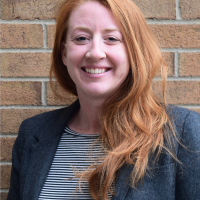Trainees
Our RETCC trainees participate in multiple projects and community engagement opportunities across the Columbia University Northern Plains Superfund Research Program. Below, Core leaders Drs. Annie Nigra and Ben Bostick with RETCC trainees during the CUNP-SRP kick-off event in December 2022.

Current Trainees
Shams Azad, PhD
- Postdoctoral Research Fellow, Columbia Climate School
Dr. Shams Azad earned his doctoral degree from New York University. His research focuses on investigating pollutant exposure dynamics through applying advanced sensing techniques and data-driven methodologies.

Stephanie Calluori
- PhD student, Columbia University Mailman School of Public Health
Using epidemiological methods, Stephanie’s research examines the effects of environmental exposures on epigenetic biomarkers, and the ultimate impact on women’s and children’s health.

Grace Cammarata
- MPH student, Columbia University Mailman School of Public Health
Grace is pursuing an MPH in the Environmental Health Sciences department at Columbia University Mailman School of Public Health. Her work focuses on leverging social determinants of health and community-based participatory research to enhance environmental justice.

Clara Chang, PhD
- Postdoctoral Research Fellow, Lamont-Doherty Earth Observatory
Clara is interested in using uranium isotopes to understand contaminant mobilization and map hotspots in groundwater.

Carolyn Gigot, PhD
- Postdoctoral Research Fellow, Columbia University Mailman School of Public Health
Dr. Carolyn Gigot is an environmental epidemiologist interested in novel biomarkers of environmental exposures and health effects.

Heidi Hannoush
- Master's student, Columbia University Mailman School of Public Health
Heidi's work focuses on toxic metal exposure from food, water, and other environmental matrices.

Wending Li, PhD
- Postdoctoral Research Scientist, Columbia University Mailman School of Public Health
Wending’s research investigates the cardio-metabolic effect of arsenic and employs advanced deconvolution method to understand how environmental exposure may elicit tissue-specific response in humans.

Catherine Lucey
- PhD student, Columbia University Mailman School of Public Health
Catherine's research focuses on developing methods to isolate individual blastomeres from 8-cell stage mouse embryos and on arsenic and selenium metallomics.

Tavehon 'TJ' McGarry
- Undergraduate Student, Lamont-Doherty Earth Observatory
Tavehon's research employs remote sensing and machine learning techniques in order to predict hazardous geochemical contamination in ground-water dependent communities.

Katlyn McGraw, PhD
- Postdoctoral Research Fellow, Columbia University Mailman School of Public Health
Katlyn’s research focuses on exposure to underregulated pollutants and their contribution to heart disease, in particular metals, volatile organic compounds, and benzene.
![]()
Arijeet Mitra, PhD
- Postdoctoral Research Fellow, Columbia University Mailman School of Public Health
Arijeet’s research focuses on the application of stable and radiogenic isotope systematics on tracing the source and transportation pathways of pollutants (metals and metalloids) in the environment and biological substances.

Kevin Patterson
- PhD student, Columbia University Mailman School of Public Health
Kevin's work focuses on environmental justice in American Indian and Native communities.

Adelina Rolea
- PhD student, Columbia University
Adelina's research focuses on mitigating the exposure of hazardous substances on vulnerable populations, and her approach as a geochemist is to center environmental justice and community involvement in both research and fieldwork.

Grace Santos
- PhD student, Columbia University Mailman School of Public Health
Grace’s research focuses on analyzing selenium speciation in the Strong Heart Study and plans to examine the underlying genetic and non-genetic determinants of selenium metabolism and its mechanistic involvement in diabetes risk.

Nivetha K. Subramaniam
- PhD student, McGill University
Nivetha's current research primarily focuses on mixtures of low dose metal exposure and risk of cardiometabolic diseases. Her primary research area centers on utilizing in vitro and in vivo approaches to study the pro-atherogenic effects of mixtures of arsenic and cadmium exposure at environmentally relevant concentrations.

Anna Tillery, PhD
- Postdoctoral Research Fellow, Columbia University Mailman School of Public Health
Anna’s research focuses on understanding the impact of rural air pollution exposures on cardiovascular health and electronic cigarettes.

Alumni Trainees
- Maria Argos, PhD
- Zahid Aziz, PhD
- Anne Bozack, PhD
- Felicia Castriota, PhD
- Adina Cazacu-De Luca, BS
- Christine George, PhD
- Yu Chen, PhD
- Saugata Datta, PhD
- Ratan Dhar, PhD
- Christian Dye, PhD
- Sara Flanagan, DrPH
- Danella Hafeman, MD, PhD
- Marni Hall, PhD
- Megan Hall, PhD (Post-doc)
- Ezazul Haque, MS
- Kristin Harper, PhD (Post-doc)
- Yi He, PhD
- Allan Horneman, PhD
- Caitlin Howe, PhD
- Farideh Hosseini Narouei, PhD
- Hun-Bok Jung, PhD
- Alison Keimowitz, PhD
- Khalid Khan, DrPH
- Mohammad Kibriya, MD (Post-doc)
- Peter Knappett, PhD (Post-doc)
- Franziska Landes, PhD
- Mengyuan 'Maggie' Li, PhD
- Irene Martinez-Morata, MD, PhD
- Wil Lieberman-Cribbin, PhD
- Melanie Mayer, PhD
- Danielle Medgyesi, PhD
- Stephanie Melkonian, PhD
- Ivan Mihajlov, PhD
- Rajib Mozumder, PhD
- Jessica Napolitano, PhD (Post-doc)
- Megan Niedzwiecki, PhD
- Bethany O'Shea, PhD
- Faruque Parvez, DrPH
- Gene Pesola, MD (Post-doc)
- Brandilyn Peters, PhD
- Meridel Phillips, MS
- Brandon Pierce, PhD (Post-doc)
- J. Richard Pilsner, PhD
- Martha Powers, PhD
- Karrie Radloff, PhD
- Tiffany Sanchez, PhD
- Molly Scannell Bryan, PhD
- Elizabeth Shoenfelt Troein, PhD
- Marisa Sobel, PhD
- Maya Spaur, PhD
- Miranda Spratlen, PhD
- Jing Sun, PhD
- Beth Weinman, PhD
- Karen Wovkulich, PhD
- Qiang Yang, PhD (Post-doc)
- Di Zhao














